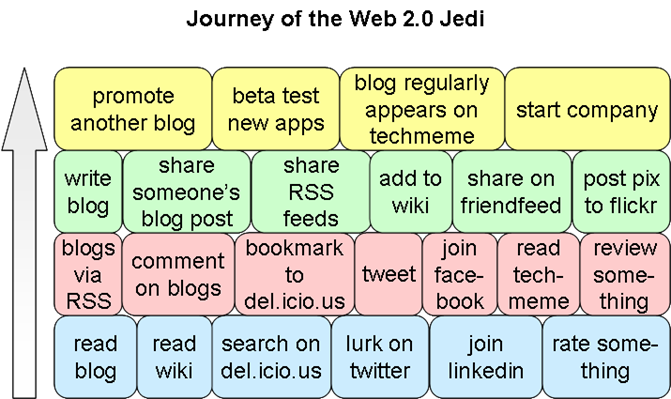If I was looking to impress, or be impressed, I'd follow the advise given by Brian Kelly in this recent post over on his blog: UK Web Focus.
"Although I don’t feel that everyone should necessarily publish a blog, make use of Twitter or, indeed, give presentations or appear on YouTube or Google Video, I do feel that these can be skills which will be valuable for many information professionals and software developers at a time of economic difficulties.
And if that short-term project fails to receive continued funding how should staff ensure that they can continue to find employment in the job market? I would argue that having demonstrable skills in making use of a range of Web 2.0 technologies may well help.
This might include:
And of course as well as having skills in use of such social networking tools, having a community of peers may well also be valuable in a new job.
- publishing a blog (which can demonstrate good written communications skills),
- creating and editing content in wiki tools such as Wikipedia (demonstration of collaborative working),
- using micro-blogging tools such as Twitter (the ability to interact with other users, including those you may not have met),
- using social sharing tools such as del.icio.us (as awareness of the benefits of sharing resources using popular services) and
- social networking services such as Facebook (all of the above together with an understanding of privacy and other ethical issues).
Hmm, will:
“You mean to tell me you worked in a library and you only ever used email and a word processor? You used a Web browser but never used an RSS reader? You contributed to a newsletter but never published a blog? Thank you for your interest in out company. Next candidate please.“
be the approach that employers will take when there is a large pool of information professionals to chose from?"
I've just finished reading Seth Godin's new book "Tribes" (really good) and he shares the story of selecting interns for his business. He set up a facebook account - then left them to it. 1/2 the people started to introduce themselves, communicated with each other and then tried to encourage the others to contribute - but the rest sat back and watched. Who would you rather employ? Quite.
So where abouts are you on this groovy little chart by Hutch Carpenter?






